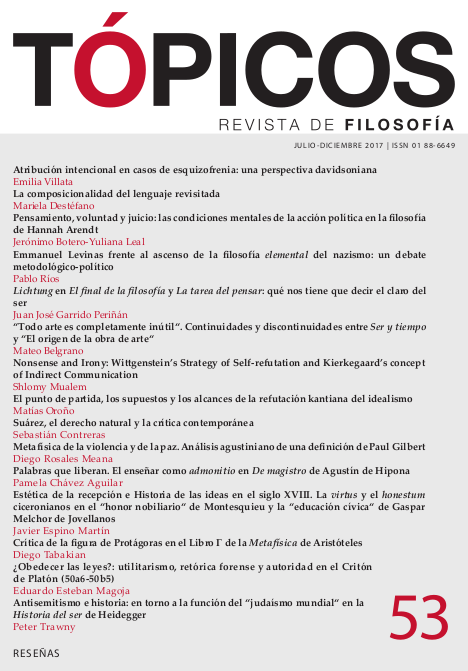Emmanuel Levinas frente al ascenso de la filosofía elemental del nazismo: un debate metodológico-político
Pubblicato 2017-07-01
Parole chiave
- nazismo,
- filosofía elemental,
- sentimiento elemental,
- libertad,
- metodología
- política ...Più
Come citare
Abstract
En Algunas reflexiones sobre la filosofía del hitlerismo (1934) y frente al ascenso del nazismo en Europa, Levinas convoca a la civilización europea, en particular a las tradiciones judía, cristiana, liberal y marxista, a enfrentarse con el surgimiento de la filosofía elemental del hitlerismo. En este breve artículo, el filósofo exhorta a dichas tradiciones a remontarse a sus fuentes, intuición y decisión originarias, en especial, al “espíritu de libertad” que las anima y a su concepción del destino humano (Levinas, 1934: 8). Sin embargo, las reflexiones levinasianas dieron lugar a un debate metodológico-político sobre cómo interpretar esta apelación a un “espíritu” o “sentimiento” compartido por las tradiciones europeas de Occidente, así como sobre el significado que adquiere la contraparte elemental y amenazante del hitlerismo. El presente artículo tiene como objetivo indagar algunos aspectos de este debate metodológico- político suscitado por los escritos de Levinas de entreguerras.
Riferimenti bibliografici
- Abensour, M. (2001). El Mal elemental. En Levinas, E. (2001 [1934]). Algunas reflexiones sobre la filosofía del hitlerismo. Horrac (trad.) Buenos Aires, Argentina: Fondo de Cultura Económica.
- Aramayo, R. (2009). La Neo-Ilustración preconizada por Cassirer en Davos y a favor de Weimar. En Cassirer y su Neo-Ilustración. La conferencia sobre Weimar y el Debate de Davos con Heidegger. Madrid: Plaza y Valdés.
- Bergès, M. (1997). Vichy contre Mounier. Les non-conformistes face aux années 40. Paris: Económica.
- Bojanic, P. (2014). Las responsabilidades de Levinas. Reflexiones sobre ‘Quelques é exions sur la philosophie de l’hitlérsime’. En Dreizik, P. (ed.) Levinas y lo político. Takahira, A. (trad.) Buenos Aires: Prometeo.
- Brumlik, M. (2014). Una lectura de Algunas reflexiones sobre la filosofía del hitlerismo. En Dreizik, P. (ed.) Levinas y lo político. Osswald, A. (trad.) Buenos Aires: Prometeo.
- Burrin, P. (1984). La France dans le champ magnétique des fascismes. En Le Débat, (32), 52-72.
- Caygill, H. (2002). Levinas and the political. Londres: Routledge.
- Critchley, S. (2004). A Disparate Inventory. En The Cambridge Companion to Levinas. S. Critchley y R. Bernasconi (eds.) Cambridge: Cambridge University Press.
- Delhez, M. (2002). La ‘Kehre’ levinaseana. En Dreizik, P. (ed.) Levinas y
- lo político. Takahira, A. y P. Dreizik (trad.) Buenos Aires: Prometeo.
- Derrida, J. (1997). Fuerza de ley. El “fundamento místico de la autoridad”. Barberá, A. y P. Peñalver Gómez (trad.) Madrid: Tecnos.
- Dreizik, P. (2014). La posibilidad del liberalismo en Levinas. entre dos lecturas de Husserl. En Dreizik, P. (ed). Levinas y lo político. Buenos Aires:
- Prometeo.
- Griffin, R. (2010). Modernismo y fascismo. La sensación de comienzo bajo Mussolini y Hitler. Madrid: Akal.
- Hansel, J. (2006). Paganisme et . En Cités 25 (1), 25-39.
- Kleinberg, E. (2005). Generation Existential: Hiedegger’s Philosophy in France 1927-1961. Ithaca-London: Cornell University Press.
- Levinas, E. (2009 [1986]). Conversaciones. En Levinas, E.; Poirié, F. Ensayo y conversaciones. Lancho, M. (trad.) Madrid: Arena Libros.
- ____ (2008 [1968]). Signatura. En Levinas, E. Difícil libertad. Mauer, M. (trad.) Buenos Aires: Lilmod.
- ____ (2006 [1933]). La compréhension de la spiritualité dans les cultures française et allemande. En Levinas, E. Une philosophie de l’évasion. Edel-Matuolis, L. (trad.) Cités 25 (1), 126-137.
- ____ (2006 [1931]). Friburgo, Husserl y la fenomenología. En Los imprevistos de la historia. Checchi, T. (trad.) Salamanca: Sígueme.
- ____ (2005 [1940]). La obra de Edmund Husserl. En Descubriendo la existencia con Husserl y Heidegger. Vázquez, M. E. (trad.) Madrid: Síntesis.
- ____ (2004 [1930]). La teoría fenomenológica de la intuición. Checchi, T. (trad.) Salamanca: Sígueme.
- ____ (2001a [1990]). Postscriptum. En Levinas, E. Algunas reflexiones sobre la filosofía del hitlerismo. Ibarlucía, R. y B. Horrac. (trad.) Buenos Aires: Fondo de Cultura Económica.
- ____ (2001 [1934]). Algunas reflexiones sobre la filosofía del hitlerismo. Ibarlucía, R. (trad.) Buenos Aires: Fondo de Cultura Económica.
- ____ (2000 [1935]). De la evasión. Herrera, I. (trad.) Madrid: Arena Libros.






